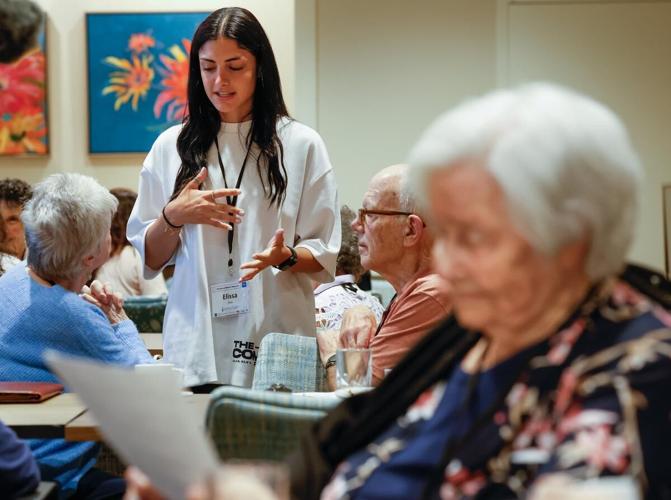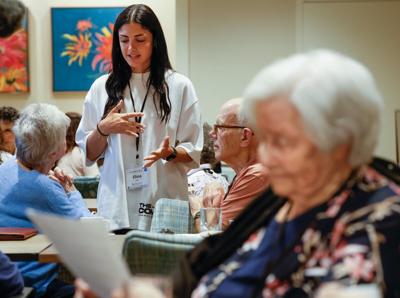ItŌĆÖs an awkward question, but Raza Mirza always asks: What age is officially old?
ŌĆ£DonŌĆÖt say 30,ŌĆØ the University of ║ŻĮŪ╔ńŪ°╣┘═°professor says, looking at the students in his ageing and health class. Half are undergrads in their early 20s; the other half are residents of retirement community Christie Gardens in their late 60s to late 90s.
Most years, the undergrads answer 30, 45 or 60 ŌĆö numbers weighted with societal expectation, he explains later. They think, at 30, youŌĆÖre supposed to be starting a family. At 60, maybe youŌĆÖre retired.
But this classroom looks a little different.
ŌĆ£When you cease to love life,ŌĆØ answers Virginia Mills, in her late 80s.
ŌĆ£Ninety-nine,ŌĆØ one older woman says with a laugh.
ŌĆ£When I retired and lost contact with the younger generation,ŌĆØ says another resident.
In the recreation room at Christie Gardens Apartments and Care, there are scones, muffins and coffee. All the students wear name tags. Teaching assistant Jessica Hsieh and co-instructor Christopher Klinger pace the room with a microphone to get answers, giving the class the feel of a 1990s talk show. Students have yellow and red cards they hold up if they want the instructors to speak louder or slow down.

U of T professor Raza Mirza heads up the course with Christopher Klinger and Jessica Hsieh.
Rick MadonikMirza, who is also the director of national partnerships and knowledge mobilization with the non-profit HelpAge Canada, has had Christie Gardens residents speak to previous classes. ŌĆ£What happens is that people forget about each otherŌĆÖs ages, and we start to address some of these ageist stereotypes,ŌĆØ he says. HeŌĆÖs always wanted more of that integration. When he and Christie Gardens CEO Heather Janes attended a roundtable on ageing earlier this year, Janes suggested that Mirza bring his students to Christie Gardens.
ŌĆ£I went and said, ŌĆśThis classroom is actually better than most of our U of T classrooms,ŌĆÖŌĆØ he recalls. Maybe he could host the entire class here, mixing undergrads and residents.
Both Mirza and Janes were surprised that the Intergenerational Classroom, as itŌĆÖs known, came together so quickly, given the logistics, bureaucracy and pandemic protocols involved. The Christie Gardens Foundation gave a small grant to cover some costs, the retirement community provided the venue, and the university waived class fees for the residents.
On the first day of class, Mirza tells the students he hasnŌĆÖt slept in two days because his dream ŌĆö of having the ageing experts in the room ŌĆö is coming true.
So how old is old?
The younger cohort hesitates to answer. Eventually, an undergrad raises her hand. ŌĆ£I mean no offence,ŌĆØ she says and offers 70, explaining thatŌĆÖs when her grandfather changed his outlook on life.
ŌĆ£Telling someone they are old is almost offensive in society,ŌĆØ Mirza tells the Star later. The students will unpack why that is in week three, when they look at ageism.
Ageism is everywhere, Mirza says, and it works against both the young and the old. ItŌĆÖs the kids-these-days narratives. ItŌĆÖs the driver honking at the senior at Costco whoŌĆÖs taking a while to fill their gas tank. Mirza, 46, says he felt ŌĆ£shame and stigmaŌĆØ as a 25-year-old in an undergrad course. He was just a few years older than the others, but he was the oldest. As a teacher, he occasionally has students in their 50s, 60s and 70s, and thereŌĆÖs always this sense that they must explain themselves, because of the perception that university is for the young.
During week one of the Intergenerational Classroom, students explore their established ideas about ageing. What is it about ageing that worries you? (Losing my mind. Losing my independence. Losing my friends.) What are you looking forward to? (Learning how to play new music. Starting a family.) What is a word you associate with growing older? (Wisdom. Invisibility. Condescension.)
If you could be any age, what would you pick?
A few say 19, but at the back of the class, Joan Good says 65. She is 92, but at 65 she was at the peak of freedom ŌĆö free to travel, free to speak her mind without fear of employment repercussions. An undergraduate at her table agrees. She expects 65 will be the best, because menopause will be over.
The students are handed ŌĆ£age cardsŌĆØ to foster conversation. GoodŌĆÖs card asks, ŌĆ£What was life like in your hometown when you were growing up, and where were you born?ŌĆØ
Good ŌĆö who is wearing her motherŌĆÖs cameo earrings ŌĆö was born in China, where her parents were missionaries. They left during the Second World War, and she was a preteen when she made the harrowing journey over ŌĆ£the Hump,ŌĆØ the name Allied pilots gave to the route over the eastern Himalayas.
Across from her, William Wynne, 21, has a laptop covered with yacht rock, the Clash, and Franz Ferdinand stickers. He tells Good about his upbringing in Alberta.
ŌĆ£My grandfather always said, ŌĆśWhen youŌĆÖre bored of life, thatŌĆÖs when you get old,ŌĆÖŌĆØ he says.
ŌĆ£You have to have curiosity,ŌĆØ Good agrees. ŌĆ£But can you teach it?ŌĆØ
Wynne says he thinks people are born with curiosity, but some lose it. ŌĆ£Who doesnŌĆÖt want to understand the world around them?ŌĆØ he asks.
ŌĆ£Some people,ŌĆØ Good says, shaking her head.
Sitting a few seats down, a resident named Lois says that when she was young, she thought getting older would involve gin and tonics with her brothers on sunny afternoons. But her brothers died many years ago, and all her old friends are gone now too. ŌĆ£My personal support workers have never heard of Humphrey Bogart,ŌĆØ she says.
The room is buzzing with interesting conversation. In the coming weeks, they will talk about the health-care system, chronic illness, social isolation, dying and bereavement. ŌĆ£At the Halloween class, we dress up,ŌĆØ Mirza says.
Joan Good is looking forward to all of it: ŌĆ£IŌĆÖm offering myself as an elderly person with a good view of life and somebody who has many experiences and an open mind.ŌĆØ




























To join the conversation set a first and last name in your user profile.
Sign in or register for free to join the Conversation